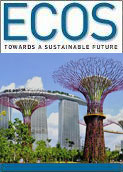
|
Published: 25 March 2013
Planetary stability must be integrated with UN targets to fight poverty
In the wake of recent meetings at the United Nations on the definition of Sustainable Development Goals (SDGs), a group of international scientists has argued in the journal Nature for a set of six SDGs that link poverty eradication to protection of Earth's life support.
The researchers argue that in the face of increasing pressure on the planet's ability to support life, adherence to out-dated definitions of sustainable development threaten to reverse progress made in developing countries over past decades.
Ending poverty and safeguarding Earth's life support system must be the twin priorities for the SDGs, say the researchers. The team says that, if met, the six goals would contribute to global sustainability while helping to alleviate poverty.
‘Climate change and other global environmental threats will increasingly become serious barriers to further human development,’ says lead author Professor David Griggs from Monash University.
‘Humans are transforming Earth's life support system – the atmosphere, oceans, waterways, forests, ice sheets and biodiversity that allow us to thrive and prosper – in ways likely to undermine development gains’, he added.
Co-author Professor Johan Rockström, director of the Stockholm Resilience Centre said, ‘Mounting research shows we are now at the point that the stable functioning of Earth systems is a prerequisite for a thriving global society and future development.’
The team asserts that the classic model of sustainable development, of three integrated pillars – economic, social and environmental – that has served nations and the UN for over a decade, is flawed because it does not reflect reality.
‘As the global population increases towards nine billion people sustainable development should be seen as an economy serving society within Earth's life support system, not as three pillars,’ says co-author Dr Priya Shyamsundar from the South Asian Network for Development and Environmental Economics, Nepal.
The researchers say that the Millennium Development Goals (MDGs), set to expire in 2015, have helped focus international efforts on eight poverty-related goals. However, despite successes in some areas – the number of people living on less than one dollar a day has been more than halved – many MDGs have not been met, and some remain in conflict with one another.
Economic gains, for example, have come at the expense of environmental protection. Politicians are struggling to link global environmental concerns with addressing poverty.
The new set of goals – thriving lives and livelihoods, food security, water security, clean energy, healthy and productive ecosystems, and governance for sustainable societies – aim to resolve this conflict.
The targets beneath each goal include updates and expanded targets under the MDGs, including ending poverty and hunger, combating HIV/aids, and improving maternal and child health. But they also define a set of planetary ‘must haves’: climate stability, the reduction biodiversity loss, protection of ecosystem services, a healthy water cycle and oceans, sustainable nitrogen and phosphorus use, clean air and sustainable material use.
Co-author Dr Mark Stafford Smith, science director of CSIRO's climate adaptation research program, said: ‘The key point is that the SDGs must genuinely add up to sustainability.
‘The SDGs have the potential to lock in the spectacular gains on human development that we have achieved in the past two decades and help the globe transition to a sustainable lifestyle. But the link between these two aims must be more coherent’.
The new research is linked to Future Earth, a new international research programme designed to ‘develop the knowledge required for societies worldwide to face challenges posed by global environmental change and to identify opportunities for a transition to global sustainability’. Several authors are closely involved in developing this research program.
‘Ultimately, the choice of goals is a political decision. But science can inform what combination of goals can achieve a sustainable future. And science can identify measurable targets and indicators,’ said Dr Stafford Smith.
Source: International Council for Science, EurekAlert!




